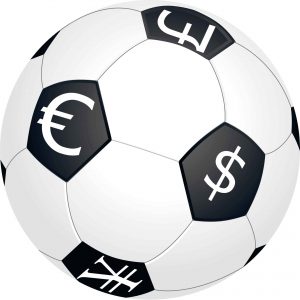Billions in broadcast rights, mega-transfer deals – money makes the ball go round and – goals. Yet a non-capitalist phenomenon trumps all…

By JVG
A few months ago, after a soccer fan died of a heart attack during a Bundesliga match in Dortmund, the 80,000 supporters at the stadium observed a few minutes of silence and then sang the song so popular with fans around the world: “You’ll Never Walk Alone.” The Liverpool anthem was a fitting tribute in that tragic moment. It was also a fitting anthem for the two clubs, Dortmund and Mainz, two clubs that in Germany are regarded as bastions of soccer tradition.
Both have in the past also boasted that true soccer-romantic, manager Jürgen Klopp, at their helm.
But Klopp has since moved on to Liverpool. And he, too, is not alone there – he is adored by Liverpool fans, even though his salary, of course, comes mainly from US billionaire John W. Henry. Like most British clubs, Liverpool belongs to an investor, a member of that group which has helped leech the romance out of soccer in the country where the “beautiful game” was born. The fans, who continue to cheer and mourn along with their teams, are now little more than but a touch of local color, a background chorus of voices and whistles, whose only true value lies in their willingness to shell out for overly expensive admission tickets, merchandising products and Sky TV subscriptions.
Investors such as Russian tycoon Roman Abramovich (FC Chelsea) and Sheikh Mansour bin Zayed Al Nahyan (Manchester City) are not only interested in the game itself. They have also injected global financial interests into soccer. The Premier League clubs will pocket $10.5 bn for broadcasting rights over three seasons.
For each club, that entails an average 50 percent increase in earnings – for what is already the world’s wealthiest soccer league.
The German Bundesliga clubs are outclassed in this respect – although the Bundesliga has managed to secure a new broadcast deal that would raise revenues from $2.7 to $5 bn. Currently, however, all 20 Premier League clubs rank among the 40 wealthiest clubs in Europe.
The result is that a middle-of-the pack Bundesliga player such as Augsburg defender Abdul Rahman Baba was able to secure a $23 mn deal by moving to England. Transfer earnings and increasing revenue from broadcast rights, which depend on a club’s position on the table, have caused the German Bundesliga transfer market to overheat. The big clubs are devouring the smaller ones.
Big business, complete with investors, billions in broadcast rights and mega-transfer deals, is now king in all major leagues. This is part of what has made national championships and the Champions League an increasingly predictable and yawn-inducing affair. Money means goals. The same big-money clubs have dominated their respective leagues for years now. All the claims have been staked. Big business is squelching competition.
The only race that’s left now is the competition among wealthy investors.
It is unlikely that the Brexit will have an impact on this flourishing business.
Rather surprisingly, given our age of globalization, the romance of soccer remains alive and well among the national squads. Since British clubs have scooped up so many of the world’s top players, the national team must recruit about a quarter of its squad from the Premier League. By the same token, smaller countries are gaining in strength because their players are also gaining experience in top leagues and then returning to play on the national squads of their home countries. For these international players, an added bonus is that a good showing at a European or world championship then helps to boost their market value.
We must remember, though, that this big business is dependent on a decidedly non-capitalist phenomenon – the joy of soccer.
And that holds true for both the Real Madrid stadium and back courtyards of Berlin – where the Boateng brothers learned to love the game. Today, they are both highly paid professionals.
